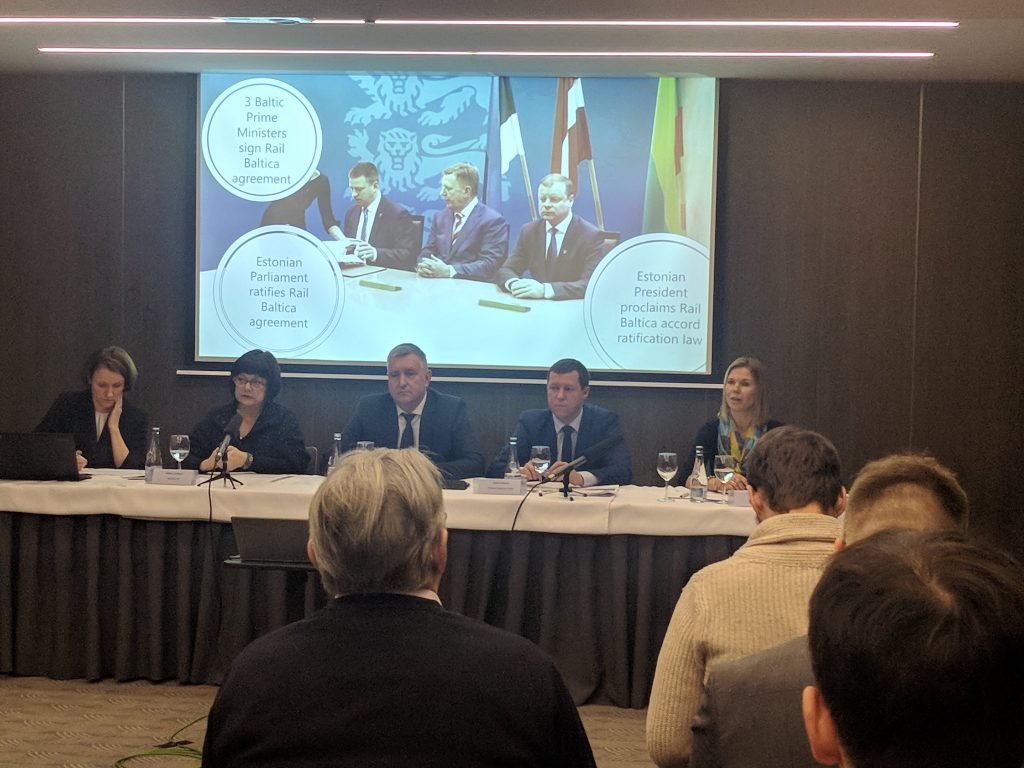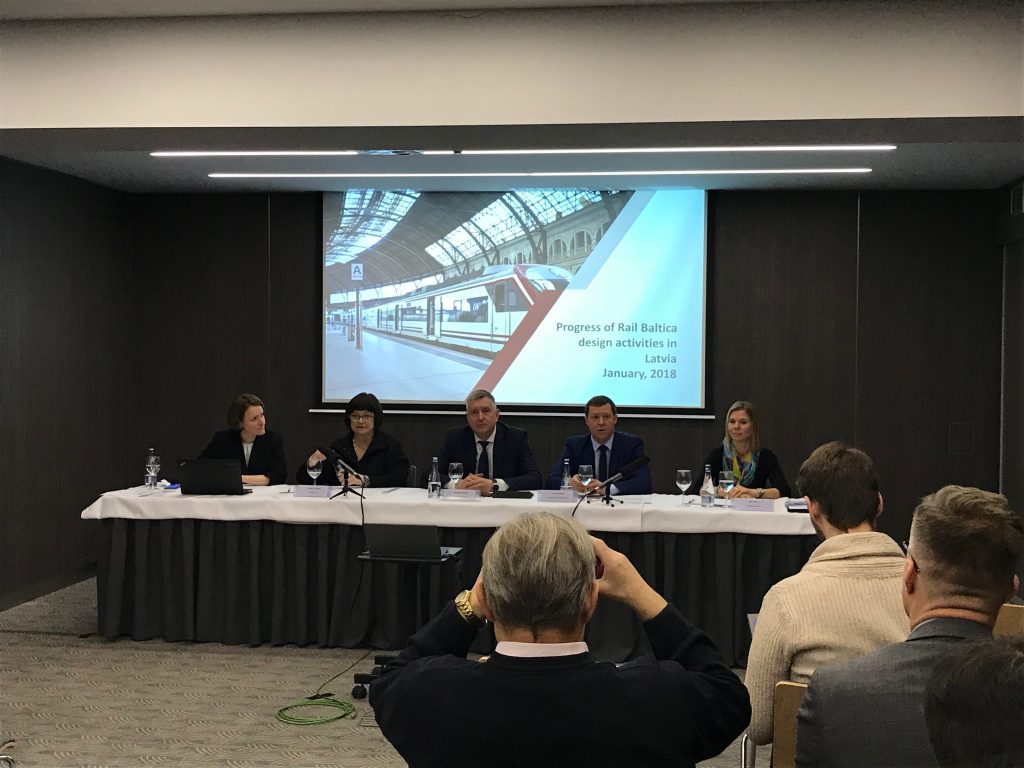On January 23, 2018, Rail Baltica official implementers held a press conferences to present the progress of the Rail Baltica project implementation in the three Baltic states and plans for this year. The progress was presented by Baiba Rubesa, Chairperson of the Board of RB Rail AS, Arenijus Jackus, Director of Rail Baltica Coordination Department at Lietuvos geležinkeliai JSC, Agnis Driksna, Director, Development and Cooperation Department at Eiropas Dzelzceļa Līnijas SIA, and Riia Sillave, CEO of Rail Baltic Estonia OU.
 During the press conference Baiba Rubesa pointed out four key milestones met in 2017. “First of all, the three Baltic parliaments ratified the Intergovernmental Agreement on the Rail Baltica project thus confirming their long-term commitment to the Rail Baltica project development. Also, the Cost-Benefit Analysis (CBA) of the Rail Baltica Global Project delivered by Ernst & Young and Atkins international experts, based on the EU CBA guidelines proved that the project is financially feasible and viable and its measurable benefits will outweigh the costs. With a 5.8 billion euro investment, a benefit of 16.2 billion is envisaged, thus, giving the beneficiaries sufficient grounds to continue the project’s development. Thirdly, the Rail Baltica implementers working well as a team have managed to enter the Design phase of the Rail Baltica project in the three Baltic states by the end of 2017. Fourth, in 2017 the third application for the Connecting Europe Facility Financing for project implementation was submitted receiving a positive decision at the EU leading all parties to the current Grant Agreement preparation process. It is notable that in the last CEF call for the first time ever the Commission has attributed additional funding of 19 million euro beyond national allocations, demonstrating the Commission’s strong commitment to the Rail Baltica project,” said Baiba Rubesa.
During the press conference Baiba Rubesa pointed out four key milestones met in 2017. “First of all, the three Baltic parliaments ratified the Intergovernmental Agreement on the Rail Baltica project thus confirming their long-term commitment to the Rail Baltica project development. Also, the Cost-Benefit Analysis (CBA) of the Rail Baltica Global Project delivered by Ernst & Young and Atkins international experts, based on the EU CBA guidelines proved that the project is financially feasible and viable and its measurable benefits will outweigh the costs. With a 5.8 billion euro investment, a benefit of 16.2 billion is envisaged, thus, giving the beneficiaries sufficient grounds to continue the project’s development. Thirdly, the Rail Baltica implementers working well as a team have managed to enter the Design phase of the Rail Baltica project in the three Baltic states by the end of 2017. Fourth, in 2017 the third application for the Connecting Europe Facility Financing for project implementation was submitted receiving a positive decision at the EU leading all parties to the current Grant Agreement preparation process. It is notable that in the last CEF call for the first time ever the Commission has attributed additional funding of 19 million euro beyond national allocations, demonstrating the Commission’s strong commitment to the Rail Baltica project,” said Baiba Rubesa.
In 2017, in RB Rail AS leadership the Common procurement guidelines, minimal criteria were defined according to the national and EU normative requirements and international megaproject implementation standards. Also, common contract templates were prepared for all Rail Baltica tenders. In 2017, RB RAIL AS altogether announced 28 tenders, of which 21 were concluded with a decision and three of them re-launched due to candidates not qualifying, while in one tender the proposed service fee exceeded the contract price.
“Our work with procurement is based on transparency principles. Last year was important for dialogue with potential suppliers, building equal opportunities to all – we organized the Industry Suppliers’ Day, introduced procurement newsletters and established a tender section in four languages on the official global project website railbaltica.org for transparent information accessibility,” told B. Rubesa.
 As the Rail Baltica project has now entered the Design phase, the main focus of this year will be the design of the Rail Baltica project. Work is to be finalised on the comprehensive preliminary technical design in the three countries, which means putting together the national studies to be able to create a consistent railway corridor. This year the detailed technical design tendering process in Estonia will be completed, while in Latvia and Lithuania – partially. Detailed technical design will be under way this summer for some of the sections. It is expected that whole detailed technical design will be completed in 2020.
As the Rail Baltica project has now entered the Design phase, the main focus of this year will be the design of the Rail Baltica project. Work is to be finalised on the comprehensive preliminary technical design in the three countries, which means putting together the national studies to be able to create a consistent railway corridor. This year the detailed technical design tendering process in Estonia will be completed, while in Latvia and Lithuania – partially. Detailed technical design will be under way this summer for some of the sections. It is expected that whole detailed technical design will be completed in 2020.
“The work will be continued to deliver the main studies – the operational plan, the long-term Rail Baltica Global project business plan, a series of technical studies like visual guidelines, climate change impact assessments and others – supplier market studies, commercialization studies, and the BIM strategy,” explained B. Rubesa.
The work towards finalising the Upgrade Feasibility Study for the section Kaunas/Palemonas-Lithuanian/Polish border continues. Currently the supplier of the study has submitted the second interim report which provides a comparison of alternative options on this section for reaching speed, capacity and other requirements to fully adhere to the Global Project’s definition as well as technical parameters and relevant TSIs. The report is expected to be finalised by the end of Q1 this year. A second key study, the Infrastructure management study, is planned to be completed and presented to the Baltic beneficiaries this summer to be able to make a decision on this issue by the end of 2018.
Baiba Rubesa pointed out that another important priority area this year is ensuring the Rail Baltica Global project’s sustainable financing. This means concluding work on the CEF 3 Grant Agreement, continuing to promote the project to ensure an intense co-financing ratio in the next Multiannual financial framework together with the beneficiaries, starting to implement the long-term Business plan and devising a long-term RB RAIL financing model.
“This year work will continue to strengthen cooperation with Finland and Poland, to address our future business clients, to develop the Rail Baltica digitalisation and innovation strategy, as well as to focus on possibilities to have more resource effective project implementation. As in 2017, we will continue to seek economies of scale wherever possible, thus ensuring less resources spent on this project,” said Baiba Rubesa.
